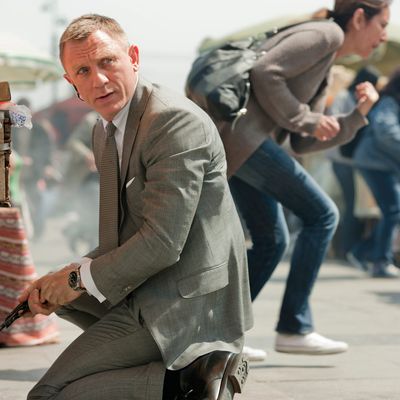
There’s a lot of witty goofing around with James Bond iconography in Daniel Craig’s third and most momentous outing, Skyfall. Director Sam Mendes has a smart, cheeky attitude toward 007s old and new — toward the tug-of-war between the traditional Bond persona established by Sean Connery and the rough-hewn, hurting, rather self-indulgent persona of Craig in the excellent Casino Royale and the passable but misdirected Quantum of Solace. Mendes and co-writer John Logan have been around the block with Shakespeare (Mendes on stage, Logan in his recent script for Ralph Fiennes’s fevered Coriolanus), and in Skyfall they play up the Coriolanuslike reluctance of Craig’s 007 to assume the role for which he has been groomed: to don the tuxedo; take his martinis shaken, not stirred; and commit himself unreservedly to Queen and country. To get him to the point where he’ll rise to the occasion and “Be Bond,” they send him into a battle that’s not just Bondian — it’s Oedipal, it’s biblical. And it’s absolutely thrilling.
No spoilers — but the linchpin of Skyfall is Bond’s mighty ambivalence about Judi Dench’s M, that mother hen all too ready to sacrifice any one of her chicks for the good of the Mother Country. In the pre-credit sequence, M directs Bond to go after a suspect rather than tend to a gravely wounded colleague, and the sacrifice and its implications linger through the chase that follows — a can-you-top-this cavalcade of glorious stunts with a shocking punchline whisking you back to the film’s first minute. This leads into Adele’s good theme song and a credit sequence in which the image of our hero sports a bullet hole somewhere in the vicinity of his heart — what’s left of it. The first act is scary, mournful, Bond for a time a disillusioned drunk — dead to the world in so many ways.
MI6 is a cold place and getting colder, and the new liaison between M and the Prime Minister, Mallory (Ralph Fiennes, no less), evinces not even a grudging affection for 007. The new Q (Ben Whishaw, no less) is a disdainful Oxbridge uber-geek, and while Naomie Harris is a sweetheart of a fellow agent, there is (literally) blood under the bridge between her and Bond. But in the course of Skyfall, 007 — and we — have to make peace with M’s less-than-humanist regime, which has produced in ways I won’t reveal, a psychotic super cybervillain named Silva, played brilliantly by Javier Bardem, his physiognomy more frighteningly distended than ever. What an entrance he makes — in long shot, the nightmare he embodies sashaying closer and closer, the dread escalating with every sadistically deliberate step. Finally, he gazes on Bond appraisingly, and with delight.
Mendes (American Beauty), a Brit who has worn out his welcome as a social critic of American suburbia, is back on home turf and going for it big-time. He seems hellbent on making the best Bond since Goldfinger — or the best, period, given that he exhumes Bond’s old Aston Martin only to shoot it to pieces, the bastard. I don’t think there’s a shot in Skyfall that isn’t intended to make you smile at its elegance, gasp at its audacity, or sit up and salute the proficiency of those high-paid Bond-picture stuntmen. (The cinematographer is the great Roger Deakins.) Mendes had a lot of money to work with, but a look at some other Bond pictures will confirm that you can’t buy taste.
The script is unusually funny, literate, and worked-out, but it runs out of invention, in the last act, set way up in Scotland at the place where for Bond it all supposedly began (life, loss, the primal injury). Mendes has a weakness for mythical images: The rain that raineth every day left his gangster saga Road to Perdition waterlogged with symbolism, and my least favorite shot of 2009 was in Away We Go — through a motel window at night of a grimly packed superhighway, Mendes forgetting that most people going to bed in the middle of big, light-polluted cities close the curtains. The beautiful-but-dumb shot here is of killers advancing over the Highlands landscape toward Bond and people he needs to protect, with Mendes apparently unconcerned that assassins with any degree of intelligence would want their arrival to be a surprise. By the time we get to the climax, Silva has degenerated into a yowling Mama’s boy, when some of us would have liked him at least to try to keep up the pretense that he’s a Bond villain.
Craig, though, holds even that ramshackle climax together. He’s not — nor could he ever be — Connery, that Scot who could look as if he belonged in an English Men’s Club without looking like an effete twit, who made the words “license to kill” seem like the privilege of men of a certain class and educational background. But the Bond movies lost their edge with Roger Moore, who sent the character up; the nonstarter Timothy Dalton (clammy, peevish); and Pierce Brosnan, who grew on me but never fully lost that dash of Remington Steele foppery. Craig’s Bond — who grieved for a dead lover, who didn’t care if his martini was shaken or stirred — was a different kind of hero. Death destroyed him. He felt everything too deeply. He was powerful, arresting. But there are lots of anguished cops/detectives/spies in our cinema. Could he be all that and Bond, too?
In Skyfall, the question is definitively answered. Each familiar 007 trapping is reintroduced, inspected, reconceived, reconciled with the hero of Casino Royale, and pronounced fit for duty. The myth is mightier than ever. James Bond is himself again.


